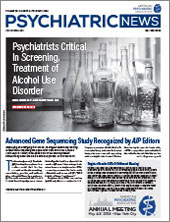According to the Centers for Disease Control and Prevention and the Department of Health and Human Services, long COVID is defined by multisystemic signs, symptoms, and conditions that continue or develop four or more weeks after initial infection with SARS-CoV-2. Symptoms can persist from weeks to years, and in some cases they are totally disabling. Overall, about 20% of patients develop long COVID after recovery from infection; the incidence is higher in those who had severe infection, but even patients who were asymptomatic with the primary infection are at risk.
Extreme fatigue and cognitive impairment are prominent issues for many of those afflicted. Cognitive problems include inattention; poor concentration; impaired frontal/executive function; memory difficulties; and “brain fog,” which is a commonly used lay term without formal definition. Sensorimotor symptoms include not only anosmia, dysgeusia, and hearing loss, but also neuropathic pain, peripheral neuropathy, paresthesias, myalgias, and weakness (see box).
Psychiatrists who have worked with patients suffering from myalgic encephalomyelitis/chronic fatigue syndrome (CFS) might find this constellation of symptoms somewhat familiar (although a history of COVID-19 would preclude the additional diagnosis of CFS). In addition to extreme fatigue, patients with CFS experience similar patterns of neuropsychological impairment. Like long COVID, CFS often develops following a viral illness.
As little is known about the pathogenesis of CFS, investigators in this area are hopeful that the intense research efforts directed at COVID-19 might shed light on mechanisms involved in CFS. It is hoped that if a biomarker for long COVID is developed, it would also help to advance CFS research. Recently, the report of a
study posted in the journal
Cell last October—building on the findings of other recent studies—raised hopes in relation to a surprising candidate biomarker: circulating serotonin levels. The researchers, from the Perelman School of Medicine at the University of Pennsylvania, used data from patients attending a post-COVID clinic as well as small animal models to construct a hypothesis regarding long COVID’s development. Their findings can be outlined as follows:
•
Some patients with long COVID show viral components of SARS-CoV-2 in stool samples long after initial infection.
•
This viral reservoir in the gut continuously triggers an immune response in the form of RNA-induced type I interferons.
•
These interferons cause inflammation that reduces absorption of gut tryptophan and disrupts serotonin signaling.
•
These processes lead to depletion of circulating serotonin, with disrupted vagus nerve signaling causing clinical symptoms.
Taken together, the findings of Wong and colleagues suggest that alterations of the gut microbiome may cause or contribute to persistent symptoms after SARS-CoV-2 infection. Moreover, the investigators found in small animal models that dietary supplementation with tryptophan or administration of the selective serotonin reuptake inhibitor (SSRI) fluoxetine reversed impairments.
These findings suggest a significant opportunity for psychiatrists treating patients with long COVID (and CFS) to systematize clinical diagnostic and treatment data to address questions such as the following:
•
What are the characteristics of long COVID patients who benefit from treatment with tryptophan or SSRIs?
•
Is the time course of improvement in symptoms the same as for SSRI treatment generally?
•
Is the course of illness for CFS patients who contract COVID-19 the same as for patients without CFS?
•
Are some SSRIs—such as fluvoxamine and sertraline, which have stronger affinity for sigma-1 receptors—better than others such as paroxetine in the treatment of long COVID symptoms?
•
Is vagal nerve stimulation helpful in reducing neuropsychiatric symptoms in patients with long COVID? ■


